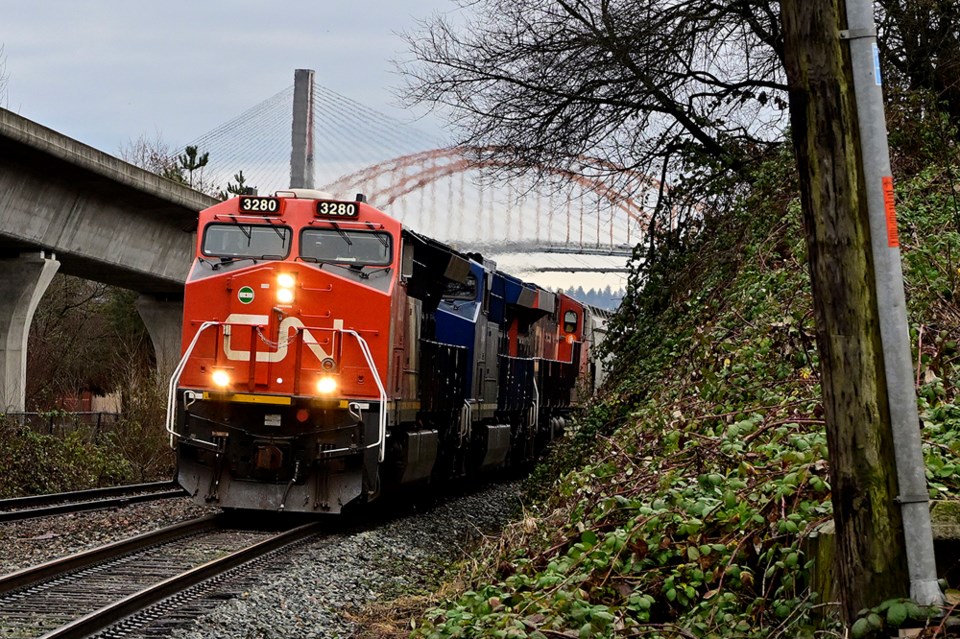It could be the latter half of 2025 by the time train whistles stop sounding at two Sapperton crossings — and the change can’t come soon enough for some area residents.
The City of New Westminster is working towards whistle cessation at two crossings: Cumberland and Columbia streets (at the entrance to Sapperton Landing), and Brunette Avenue at Spruce Street (next to the Brewery District).
An update presented to city council at the end of August provides a date estimate of the third quarter of 2025 for whistle cessation. The cost of flashing lights, bells and gates, plus upgrades to pedestrian facilities, is estimated at $1 million for the Cumberland Street crossing and $1.2 million for the Spruce Street crossing.
Mark McNally lives in a penthouse unit at the Brewery District, where he moved from Port Coquitlam a couple of years ago. He’s one of a group of residents who approached the Record with concerns about train whistles in his neighbourhood.
“The first time the train came through at two o’clock in the morning, I felt like the cartoon cat with its claws in the ceiling,” he said.
He noted the disturbance to residents is sporadic, with no way of predicting whether it will be a quiet night or whether it will be one full of train horns.
“It is very stressful. This can happen as frequently as every 10 minutes,” he said. “It may be a light tap on the horn, or it can be a very long, five-second, earthshattering honk.”
McNally lives in New West part-time, sharing his time with a home in Ontario, but said this past spring was one of the worst times he’s experienced in his two years in the unit.
“There was a two-week period where it seemed like every train operator just felt like, ‘Let’s see how long I can lay my horn on for,’” he said.
White noise and foam earplugs did little to reduce the disturbance, he said; the only solution that’s worked so far is a set of noise-cancelling earbuds that play white noise.
McNally said the issue of train noise is one of health and safety for the residents.
“You can tell it’s added to everybody’s anxiety level,” he said. “It’s had an effect on people’s property values, it’s had an effect on people’s well-being. …
“People say you do kind of get used to it, and, yes, I’ve gotten a little used to it, but there’s definitely sleep deprivation involved here.”
Train whistles are an added concern in the neighbourhood because of the proximity of Royal Columbian Hospital and the patients there, he pointed out.
While he’s glad to see the issue being talked about, McNally said change so far is happening at a “glacial” pace.
City 'optimistic' about project schedule, funding
The issue came up for discussion at the Aug. 28 council meeting, where Coun. Daniel Fontaine highlighted the possibility of whistle cessation by 2025.
“I don’t want to get too overly excited because you never know; there’s obviously a lot of hurdles that can happen,” he said.
Fontaine questioned whether the 2025 goal was realistic and whether the city has enough funding to carry out the work.
“In terms of what’s realistic, that is the schedule that we’re working towards,” director of engineering Lisa Leblanc said.
She noted the schedule includes considerations for potential risk and has some contingency built in.
“That said, we never know what might happen with the partners that we rely on to progress these projects, so there’s always a risk of schedule slip,” she said.
But she noted the city has a staff person on the file and she’s feeling “optimistic” about the schedule as reported.
Leblanc said the projects are at the conceptual design stage, so at this point the budget is a very “high-level estimate” based on previous experience.
“As we progress through the design, we’ll have a better understanding and more detailed designs and cost estimates,” she said.
She said she remains “fairly confident” there will be federal funding opportunities as the projects progress.
“It’s very much in the interest of Transport Canada to have grade crossing improvements completed,” she said, noting the city has received “millions of dollars of funding” through Transport Canada’s Railway Safety Improvement Program over the years.





